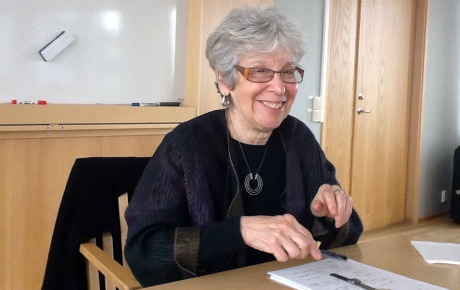
Joan Wallach Scott.
Bild: Edda Manga
"All I can forsee are battles"
2012-04-24 | Edda Manga

INTERNATIONAL
Joan Wallach Scott offers paradoxes and says that she can only foresee battles. At the same time she describes the conflict between politics and academia as worn out. During her visit in Stockholm she had a conversation with Feminism editor Edda Manga, that lasted for several hours. "She was just as vivid and sharp as the impression given by her texts – an important source of inspiration for me".
Joan Wallach Scott is a historian specialized in France. She is the Harold F. Linder Professor at the School of Social Science at the well-known Institute for Advanced Study at Princeton. Her article Gender: A Useful Category of Historical Analysis, which was published in 1986, is considered fundamental to the research field of gender history. Her most recent book is The Fantasy of Feminist History. Durham, Duke University Press, 2011.
Her lecture in Stockholm was part of a series that Tankeverket arranges at Södra teatern. During the visit Joan Wallach Scott also collaborated with a research group at Södertörns University where she gave several talks and seminars.
EM: After all these years I would like to return your question and ask you: is gender a useful analytical category?
JS: As long as it is posed as a question and not as something that we already know. When I wrote the article Gender: a useful category of historical analysis for American Historical Review the original title was Is Gender a useful category of historical analysis? The editors of American Historical Review said "we don’t have question marks in our journal" so they took it out. But in fact one of the things that really has bothered me by the way that article is sometimes used is that people don’t really read what I’ve said and instead assume that they know what gender is, that is a fixed relationship between men and women where men always dominate - not that it isn’t the case, but they think that it is all they need to know - rather than asking how is the question of sexual difference being addressed, what sorts of regulatory norms are being offered to implement it. What does it tell us about what people think about social organization? Why is it that the return to what’s thought to be normal or natural sexual difference is considered to be the foundation for social order?
My question would be what does it tell you about a society that the insistence on the naturalness of a certain normal division of sexual difference is being offered as a solution to a set of political, economical and social questions. But it is always a question mark, it is never "oh, that’s gender politics" or "I am writing a book about women so of course it is about gender".
So many people send me articles that they have written with a footnote to my article saying I am doing just what you said, and I read the article and think no, you are doing what I didn’t say which is to assume that they already know what gender is and it seems to me that even in societies that seem fairly stable and mobile gender pups up as a site of anxiety and tension at certain moments. As long as it is posed as a question gender is still a useful category of analysis.
EM: Do you think that the concept of “intersectionality” can help to keep the question mark?
JS: No, not in the term itself. I think that intersectionality has the same problems if you don’t... if intersectionality assumes that you know what gender is, what sex, what class, what race is, what sexuality is, whenever the intersection is... but in fact you always must to ask if is race inflecting gender, is gender being used for certain racist discourses. How is it being used? What sorts of connections are implicitly and explicitly being named?
What bothers me about intersectionality – some of the intersectionality work, not all of it - is that it assumes that the categories are known. But I don’t think until you do the work of analysis you know how they are operating, what it is that they are doing, how certain representations of Muslims (for example) are working both racially and in gender terms or working as religion, how race is being displaced into gender, that doesn’t happen the same way in all cases and all the time. So intersectionality is good as a reminder that you can’t just look at sexual difference, you cannot just look at gender but if you assume you know what you are looking for then it has the same limits that looking at men and women or just women has if that is what you are doing with gender.
EM: There is some kind of ethical or moral use of the concept of gender or gender equality that I know that you have criticized, could you say something about it?
JS: I am going to talk about it in one of the talks, or both of the talks that I am giving. That is the question now: what work is being done by the reference to gender equality as a primordial value of democratic western society? What work is this discourse doing in setting out Muslims outside of the acceptable parameters of those societies. And if you look at gender inequality as an issue within our societies it is still an issue.
When you displace the problem of gender inequality onto Muslim others you act as if all the problems of gender inequality have been solved in our societies and they haven’t ...Take domestic violence... when Muslims are the issue, it’s defined as honor killings—a part of “their” culture. In western societies, domestic violence is attributed to individual psychological problems. The reference to culture makes the problem seem immutable while the reference to individual psychology makes it a private matter. But domestic violence should be located in cultures of male violence whatever the culture. By talking as if only Muslims had “cultures” of violence, gender inequalities within the west are covered over, made to seem either non-existent or not a problem in the same way.
EM: Here in Sweden we are using this concept of "men’s violence against women" a concept that represent the success of a certain kind of feminist school and then the discovery of the existence of same-sex violence or violence in same-sex relations is disturbing to the model of how to understand this and I think of your idea that if you think that you know what you are searching for...
JS: ...you don’t see the issues, right? The question of same-sex domestic violence – it depends of who we are talking about and what politics we are talking about – in the gay and lesbian communities the introduction of lesbian domestic violence or gay men domestic violence raises the question of whether queer is the ethical, moral, positive alternative in every way to heteronormative oppression, you know to the oppression that supposedly attaches only to heterosexual couples. So the question of “men’s violence on women” sets it up as a certain kind of feminist view of what can and can’t be seen and can and can’t be possible and what’s being excluded is as you say is the idea that all sexual relations have a potential for violence.
I don’t think you ever know the cause of things. That is my Foucauldism , there is no origin, what you want is to know how the discourses are operating to produce certain kinds of political and social effects and it is those effects that you want to intervene with and talk about. Pointing out this contradiction: that domestic violence is seen as only one side of the arena of sexual relations obscuring the fact that there are problems of violence in sexual relations of all kinds.
EM: I was thinking about Foucault’s idea of sexuality being an important arena of power in a certain epoch. I wonder if you see gender construction as something that historically can be more or less important. You see my point? As we use it now it is as if it was ahistorical, as if gender always had been a central category for social organization, and of course gender is connected to a certain analysis of power, but If sexuality only recently, during the last centuries, has been constituted as the privileged arena where power-relations are articulated maybe the importance of gender is historically connected to that?
JS: I think that is right. Foucault was pointing out that the discourse of sexuality is all around us, and of course there is his critique of the emancipatory politics of sexual identity, In The History of Sexuality volume I, he says: the point is not to celebrate sex but to liberate ourselves from it. Later, in an interview he says that feminists have an easier time liberating themselves from - what does he call it? – the dominance that sex is given as the meaning of the self – because they are looking for all sorts of other social, political, economic equalities but the homosexual identity movement has a much harder time because sex is the issue there.
But what he is saying in both cases is that emancipation does not come from identifying yourself in terms of sex, that is the limit of the homosexual movement and that is the openness of the feminist movement. The ironic thing is that Foucault’s having critically written about this, led to all sorts of studies of sexuality that led to the proliferation of the discourses of sex and sexuality in ways that I think would horrify him.
I mean it is one of the great ironies of his work that he has opened the door to these studies that he was writing against, or critically analyzing He argued that the history of sex and sexuality had not been the history of emancipation, but instead a dense point for the articulation of power. So many studies of gender, while they gesture towards the subordination of women to man, are not really engaging with the notion that gender is a dense transfer-point for relations of power... or if they do they do it... they assume that they know what the power is... simply by saying men are dominant and women are subordinate, that’s the answer to power, whereas what Foucault is looking at is much more textured and nuanced notion of what is at stake in the productive relations of power, how subjects are produced through it, not simply oppressed by it.
EM: Does this apply to the queer movement also, the idea of inclusion of multiplicity of sexualities?
JS: This is something I say in my talk tomorrow – that "queer” is about gender, and I think people will disagree with me. But one of the things that is really interesting... but it is a long and complicated thing... Here’s my attempt to explain it:
Last summer the French Minister of Education issued a manual to prepare students of the life sciences for the baccalaureate and in it they had a chapter, and this is in my lecture for tomorrow, that is called “devenir homme ou femme” (becoming a man or a woman) Simone de Beauvoir, right? But most of the chapters were about sperm and ova and pictures of reproductive organs, charts of menstrual cycles and you know, all that kind of stuff, they said at one point, and I think accurately, that there is a difference between sexual difference, gender (social roles assigned to sexed bodies) and sexual orientation. Sexual orientation was not about your identity as a man or a woman. Those are two different things, one is public, the other is private, gender is public, sexual orientation is private. The manual was attacked by the Catholics particularly. There were petition campaigns: hundreds of legislators signed a petition saying you can’t teach this story, you are corrupting the minds of the youth, they even said the notion that you could ‘become’ a man or a woman came from Judith Butler in America.
In the answers that the minister of education gave to the protestors, he said: “we are not saying that there aren’t men or women, we are saying that sexual orientation whether it is bisexual, transsexual, lesbian, homosexual, heterosexual is a different issue from sexual identity. There is sexual difference but that doesn’t tell you what these bodies mean, a meaning that could include all or any of those orientations. In other words, there is a difference between sexual difference(bodies), sexual orientation (what one does with those bodies). In a way, identity isn’t the issue at all.
EM: Has this something to do with what you wrote in Parité?
JS: No. This is more a psychoanalytic notion that sexual difference is about the dilemma, the unanswerable dilemma of... what does it mean to be a man or a woman? What does this body mean? Why can’t I be both... My little grandson said to me once, a couple of years ago when he was about four, he said: "everybody has a penis, right?" I said "No, women have vaginas, men have penises". He said "No, no, no. We have both. You have both". He didn’t want difference to be there because it was so impossible to explain. He wanted to be able to move - fantasmatically you can move across, right?
But sexual difference is not a predictor of sexual orientation (as queer theorits have taught us) and sexual orientation, since it can vary, is not a fixed identity. Queer theory has opened our understanding of sexual orientation – it isn’t necessarily fixed, but is open to all sorts of things, all sorts of differences, all sorts of possibilities that can change in the course of somebody’s lifetime.
EM: How does this relate to the new moralism that we have seen during the last decades, because that is the other side of the problem.
JS: By the new moralism what do you mean?
EM: By new moralism I mean ideas about the necessity to recover traditional values, to restore things to their right place, men and women to their right place, but also ideas about sexual restraint, the sexual counter-revolution. And not only from the right-wing, but say, what happened in the feminist movement from the engagement in female orgasm and the celebration of the clitoris to the idea that sexuality and especially heterosexuality is the mechanism of subordination of women and that you should turn against pornography, against sado-masochism and all sorts of sexual practices?
JS: I think I can’t answer that question except by a set of questions which would be: what kind of work is this new moralism doing? With what effects? if the Right insists, in the face of escalating divorce, pornography, an explostion of sexualities, on the need to return to the so-called traditional heteronormative domestic nuclear family you could say that some of this is a phantasmatic attempt to capture or bring back something that one never was but is thought to represent a stable order that we can rely on because it suggests that there is a natural way of being a sexed person in the world and that we know what that is and that we can enforce it on everybody and the others are illegal or abnormal. On the left is it the same moralism? Or is it a mistake to link the two together? I don’t know.
When you come to the question of trafficking and the attempt to end prostitution, because prostitution is about the exploitation of women, there is a sociologist named Elisabeth Bernstein who wrote a book that is called Temporarily yours. it is about the policing and regulation of prostitution in New York, Amsterdam and Stockholm and the three different ways in which it is dealt with, here by criminalizing men, in Amsterdam by legalizing everything and in the United States by getting women off the streets. She talks about the different ways legal steps taken, but argues that they all had similar effects. In all three cases the activities of the poorest immigrant women were most affected.
These women were marginalized and driven off the streets while prostitution continued as a high end, credit card, internet operation run by “native” women rather than poor migrant women.What Bernstein argues is that the focus on sex trafficking and the notion that all prostitution is the result of trafficking, (which it is not) blinds us to the social and economic structural issues that lead some women into prostitution, but also to the fact that in other spheres of activity, men are “trafficked” as well... in place of social and economic explanations what you end up with is a moral explanation. A moral explanation that draws feminists along with many other groups to call for regulation of prostitution, the criminalizing of male clients, and the like.
EM: and then you have the perfect victim and the perfect perpetrator, it is perfect, very good operation...
JS: So there are different moralisms it seems to me, that are at work, and to say –it’s not you saying it – “we have a new moralism and everybody is doing the same thing!”... No, no, no! The picture is much more variegated and complicated in terms of who is doing it, what they think they are doing and what the effects of what they are doing are
EM: Many conferences it comes to the question of relativism, when you criticize racism and you criticize the project of saving women over there, they will accuse you of relativism. Do you have something to say about this?
JS: I do. I don’t think what we are saying when we say that gay-activists in Holland are Islamophobic, that Islam has the right to be homophobic and kill gay people. I think what we are saying is there has to be a more careful set of targets that one aims at. It is not ‘they’ have the right to what we think of as their bad practices and ‘we’ have the right to ours. To say, as some do, that all of islam is guilty of stoning adulterous women or of hanging homosexuals is not the same as saying state action in Iran against homosexuals is something to be condemned. It’s more complicated than cultural relativism, which implies that no judgments are allowed to be made because “their” culture is different from “ours.” We don’t have to countenance things we disapprove of in order to understand them. But it can sometimes be a diffcult distinction to hold.
There is a legal scholar at Berkeley named Leti Volpp who specializes in American law. In her work she has complicated the ways in which what she calls the culture defense can be used effectively without endorsing the kind of relativism you are talking about. One example she gives is of a Chinese woman whose husband has been beating and abusing the children. The woman she kills her husband. Volpp asks how you mount a defense that at once acknowledges that psychological aspects of the case and the cultural ones. And she says, well, you don’t want to use the culture argument in a relativistic way. But if you want to argue that this is somebody who became mentally ill in a situation in which she could no longer take the abuse she was taking, one factor in her mental state could be that by the ‘cultural’ standards of her family, letting the husband treat the children this way was wrong.
So you turn the cultural argument you don’t get her off because of her culture, you say in trying to explain what is a legal argument that she became temporarily insane, that works all the time in the United States for crimes of passion, you say one of the factors in her cracking up and killing him was this that by the standards of her own society he was violating something... But she talks, in this article she talks about how careful you got to be, because the other side of the cultural argument is “they do honor killings, we don’t have such a thing”, and of course we have crimes of passion all the time in which a boyfriend kills his girlfriend because she is going out with a different guy but those are treated individually whereas... is tricky to do.
She argues that in some legal cases you could do it but not as a matter of a relativistic sets of argument that we must let them do what they do and we do what we do. So again it is more complex and there is no black and white but that’s what we need to argue for always.
EM: There are some global movements or global sexual cultures that are expanding rapidly, not least the queer movement. We were talking to Joseph Massad and he is very controversial here and accused of relativism because of his says there are no homosexuals in Iran and Irak and that it is the work of the Gay International to introduce both the binary opposition and the resistance to it as something Western but before this we didn’t have the binary opposition and homosexual identities. What do you think about this kind of argument?
JS: I think it is partly right but I think it overstates the lack of connection and contact among cultures. The concepts inevitably travel, making sharp West/East distinctions difficult to maintain. Afsaneh Najmabadi (Women with Mustaches and Men Without Beards) is now working on sexual reassignment surgery in Iran. She shows that the Iranian state deals with homosexuality surgically. The goal is to ‘fix’ the problem, so if you are a man in a woman’s body or a woman in a man’s body you get the right body and the state pays for it.
At the same time the state is otherwise opposed to what they take to be homosexual relationships. It seems to me that on the one hand Joseph is right that assigning to certain kind of practices the label gay has created tremendous problems for homoerotic relationships that were understood differently and were under the wire or not paid attention to. On the other hand we are all living in a global word and there is no way that the countries he is talking about don’t also know that there is an international gay movement.
You don’t need to go and be gay activist in Iran to introduce to the leaders the possibility of this western notion what of ‘gay.’ I think he is right that imposing our ideas on other cultures is a mistake, but I also think there is something to be said for mobilizing on behalf of people that have been hanged for transgressing sexual norms in their country. But this may go back to the question of sexual orientation versus sexual identity and the argument that sexual orientations of all kinds have long existed whatever they were called and ought to be able to continue to exist in whatever forms they take.
It is the sharpening of the lines of identity politics that – again it is a double thing - on the one hand brings greater recognition to people who otherwise had to hide what they were doing or be discriminated against, and on the other hand and at the same time draw into the networks of power the very identities that you are seeking to liberate or to bring greater recognition to. Every offer of greater recognition of identity comes with a regulation of that identity.
EM: You are always talking about paradoxes!
JS: But that how it works!
EM: The use of psychoanalytic theory you have is not what we are accustomed to here. Could you elaborate on the relation between the concept of gender and sexual difference?
JS: In the introduction to my new book, The Fantasy of Feminist History, I talk about why and how psychoanalysis has become more important to me. And I think what I am… it is Freud, it is Laplanche, it is Lacan, the idea that the anatomical difference between the two bodies however different they may be, whatever forms they take, (of course I know that there is not a pure male body or a pure female body) raise the problem of what sexual difference means.
It strikes me as being very helpful for thinking about gender. Because I think now of gender as the attempt to regulate a set of meanings for a difference that cannot ever be finally symbolized.. So we are told what the boundaries are: girls do this, boys do this, men do this, women do this, but the boundaries are always moving. The boundaries are at once necessary for reassuring us about the anxiety of the meaning of sexual difference, and they are not stable or fixed.
This means that all kinds of appeals can be made to gender as a way of establishing a certain political system. So restoring calm, equilibrium , social order often comes in the form of policing the boundaries of gender in ways that are thought to be natural or known. So for me that’s the link: there is a psychic dilemma that is un-nameable and enormous amounts of social and political work go into trying to resolve it. The interesting question is how the individual quest for resolution is mobilized into a collective movement.
EM: The cessation of the anguish?
JS: Yes, the whole point is the cessation of the anguish of difference. And populism does this really well. What some of this new moralism is about right now is a way of appealing offering a resolution to the anguish of difference
EM: Do you think that the idea of equality is such a utopian movement, trying to make the anguish vanish?
JS: It depends what you mean by equality. One sense of equality comes from the liberal notion of formal equality before the law-- the same rights, the same citizenship for all individuals. Then there is another idea of equality-- the Marxist idea--that is about social equality, the same access, the same wages, and end to hierarchies of power. But I don’t think these ideas address the anxiety that we have just been talking about– that’s what we come back in my book Only Paradoxes to Offer – how can we claim equality in the name of difference?
EM: It sounds to me as if equality must be the hatred of difference in some ways. And the question for me is what happens when equality comes to be a state ideology. It is also codes as a kind of... to me also that there is a component of hatred of femaleness, even within the feminist movement
JS: I don’t agree. It may be that when equality is a state ideology, it succeeds by repressing or ignoring difference. But I don’t see how there’s a hatred of femaleness within feminist movements. There are always at least two versions of feminism (as a piece by Ann Snitow so beautifully described years ago). There are women who think of feminism as allowing them, finally, to be women; there are others who want nothing more than not to be women (as society defines them).
EM: They don’t call themselves feminists...
JS: Yes they do. Ann Snitow talked to some of her best friends, they were all feminists and they said, for me feminism is about not being a woman anymore, and for the other group of friends feminism is about being a woman. Sometimes this has been called the two schools of feminism: the equality and the difference schools, but they are all feminists. They are both working for recognition at the level of citizenship, recognition at the level of equal access to education. Where they are disagreeing is on the the need to mention certain kinds of femininity as opposed to something else. But I don’t think it is about rejecting femininity.
In Only paradoxes to offer I have women who want to dress as men and they are feminists and there are other women who are saying the virgin Mary is the embodiment of the femininity or ‘as mothers we hold up the world and produce the children.’ That’s where the anguish about what this difference means comes in: whether to accept the rules as they are, the boundaries that establish what the meaning of these differences are or to reject them.
EM: What do you think is next?
JS: Uhh! This is were historians get to say we don’t... we can only look back
EM: But you do history of the present?
JS: No but it is history of the present in the Foucauldian sense, critiquing the categories we take for granted but not presuming to know what the next will be… I don’t know. I think there is a lot of turmoil right now around all of these questions. I mean, there is a tremendous backlash but there is also a lot of feminist insistence on equal treatment, equal access to jobs and many young women who don’t call themselves feminist still take for granted, the rights about education and access to jobs, choices about sexuality that are associated with second wave feminist demands (and successes).
EM: But now we are at a backlash and feminism is under attack and even gender studies have been criticized during the last year
JS: By?
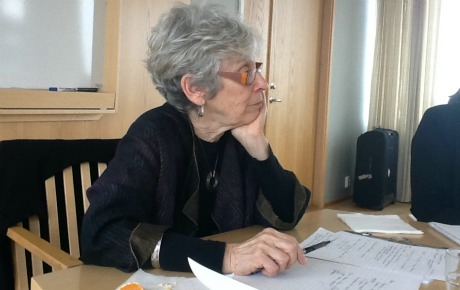
EM: There have been documentary films about this on TV and a big discussion in the newspapers.
JS: But this is what we were talking about before. The way feminism has been blamed for having disrupted the natural order of things, and gender is blamed for it because, in a time of uncertainty, our theories about gender are disruptive and threatening... That’s the problem that gender poses for conservatives. I think some of this backlash is a response to the turmoil in society and instead of looking for new solutions, the solution being offered is the return to something that is uncontestably natural or God-given.
The backlash against feminism and against gender as its theory is symptomatic of social instability. We have to fight the backlash at the level of feminist politics. Of course we have to say to politicians, no, you are not going to take away my contraception or my right to abortion, but I also think there have been enough gains that feminism has made in terms of having been incorporated into the expectations of young women in many societies that they are not easily take them away.
I do think that one of the best gifts the Republicans in the US have given Obama is the attack on women. The day after the right-wing radio broadcaster called a woman who was asking the Catholic school in Washington she attends to provide insurance coverage for birth control – he called her a slut and a whore because he said why she ‘we’ pay for her to have sex whenever she wants it – his program lost three quarters of its advertisers. There was a huge online campaign... people wrote and said I am not going to buy your products anymore if you continue to advertise... Obama immediately called that woman and he said to her if you were my daughter I would be proud of you, you are standing up for women’s rights. With that he became a hero for American women. I think it’s those kind of battles we will have to be fighting, but there are constituencies that are used to feminism’s gains who will join those battles... All I can foresee are battles, not a happy future, no utopian future…
EM: First all you have to offer are paradoxes, now all you can foresee are battles!
JS: But I do think that we have ahead of us…There are some huge battles, the church is going to try to weigh in, you know, and it is weighing in big ways…in various countries, at the United Nations. What is interesting as a scholar is to see the geopolitics of all this: who is lining up on what side and for what reasons; what they are hoping to gain from attacking women’s rights, women’s reproductive rights. It seems to me that we are going to have to be mobilized again.
If we thought we had it easy, the doors were open and we had this story of unending progress we are facing a different situation now, but is one that in fact we have the tools to fight because we have in place in many countries in the world the legislation and the social practices that people are not going to give up easily – the contraception is a good example – I just don’t see women giving up contraception, voting rights, access to education. (I’m talking about Western nations for the most part here.)Staying home? – ok, some portions of the population want women to stay home and take care of the children, but you know, look at the students we teach, their expectations... they may not think of themselves as feminists, but their expectations are that they have a claim on social resources. If they start losing them they are going to fight to hold on to them.
So in that sense I am optimistic. I think there will be a lot of fighting that we will have to do, a lot of work to be done, but we also have the resources that earlier generations didn’t have : the vote, everybody worries about the gender gap in voting, it maybe that we will have to mobilize women to vote for, and it won’t be all women, but feminists or women who think of themselves as deserving of these rights, they will have to figure out and there will have to be mobilizations but I think it will happen, these guys cannot take all this stuff away. They just can’t.
EM: Do you think that this backlash in any way is connected to the fact that the mechanism of the process of the colonial boomerang is taking a new step, former colonies like India or Brazil, Angola, now is far more dynamic than the old colonial centers and you have the whole Arabic spring and sort of revolutionary heritage and also the New left in Latin America all these things go up beyond what is happening in the West and the West is...
JS: ...hunkering down and trying to protect its own identity as it always has been? But, I think that’s right and I don’t think they can’t do it. The other thing is of course migration, the immigration of these post-colonial populations… There was a guy I heard on the radio last week who said he thought the Tea Party and the right-wing republican frenzy was the last gasp of older white Americans. In ten years they will no longer be the majority of the population of America...
But then of course there is the question of the Arab Spring and the complicated gender politics of the Arab Spring. The case of the woman in Egypt stripped for joing a protest, others subjected to “virginity” tests—there is a lot of really terrible stuff going on-- which is not to say that this is because of Islam, but it is to say that the control of women is one way of imposing social control. These tactics are probably not going to succeed, I mean look at the women who marched after the attack on the women in Egypt, the women in Iran last year after the election thousands of women marching to protest corruption...
EM: But they manage to split the revolution unity by the question of women and the family, you know? It is operative.
JS: Yes, it is operative. And the question of how and whether they are going to reform family status law is a huge question... but there are feminists in those countries, we don’t have to do it for them. though that’s the American or the western impulse...
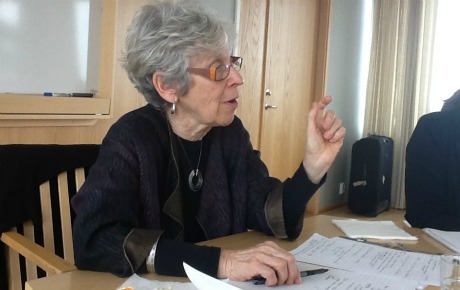
EM: My last question has something to do with this because there is something which is supposed when you meet American intellectuals, a relation between analysis and politics, there is a presupposition that there is direct relation between academic work and politics. Here many people are saying that gender studies has lost vigor because it has lost attachment to the activists.
JS: Wendy Brown is the one that has said this the best, she says of course there is no direct relation between theory and politics. The point of theory is to propose critical ways of looking at things, the point of politics is pragmatic action and implementation and the two cannot be the same. Which doesn’t mean they can’t sort of feed each other, when one does theoretical work one looks at the real world and says why are these things happening and how can we think critically about them.
The false dichotomoy between theory and practice was evident in feminism from the beginning, at least in the United States. There was real politics and academic politics, activists and theorists. I don’t think that’s the right way to think about it, I never did. Some of us did both, some people did one or the other and there was a kind of synergy between the movements but they were never the same movement. So my sense is that those of us interested in political issues who are scholars have to continue the critical work, asking difficult questions instead of imposing binary—good/bad—categorizations.
We have to ask how women are being oppressed, instead of assuming we know why, how things vary historically and contextually—not every battle is the same. I think that the critique between the academic and the political is an old one and doesn’t get us anywhere, it doesn’t see that at least some of us who do the academic work understand its limits even as we want to participate in political movements that are about changing the situation of women.
Kommentarer
Du måste vara inloggad för att kunna lämna en kommentar.







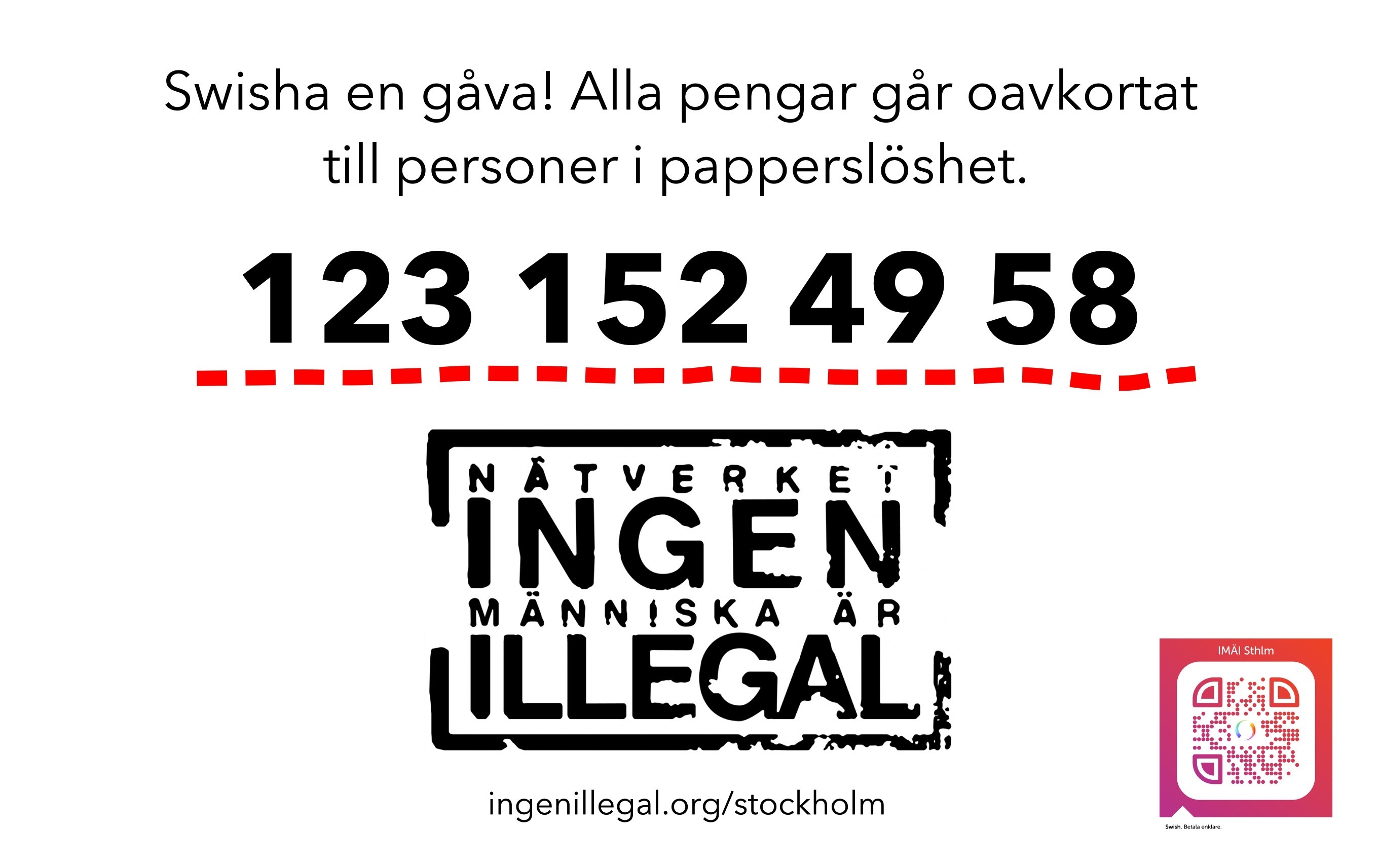



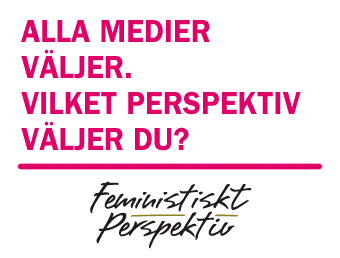












MEST KOMMENTERAT
SENASTE KOMMENTARERNA
Om Var Grupp 8 en feministisk organisation?
Om #bildskolan 21: Att äta Den Andre
Om #bildskolan 21: Att äta Den Andre
Om Porr handlar om betalda övergrepp
Om Nobels fredspris till kampanj för att avskaffa kärnvapen
Om Feministiskt perspektiv öppnar arkivet och startar på nytt!
Om Rödgrönt ointresse för fred och nedrustning borde oroa många
Om Var inte målet att vi skulle jobba mindre?
Om Feministiskt perspektiv öppnar arkivet och startar på nytt!
Om Feministiskt perspektiv öppnar arkivet och startar på nytt!
MEST LÄST